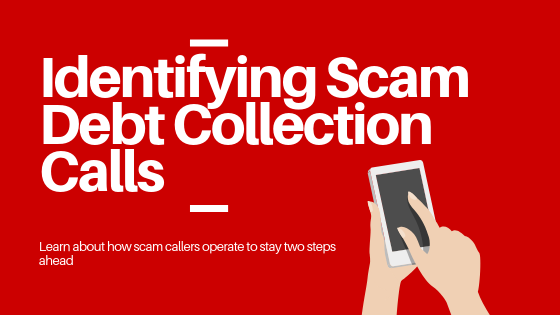Identifying Scam Collection Calls

When you are in debt, especially if that debt has been passed on to a debt collection agency, it is common to receive phone calls trying to convince you to repay your debts in as short a time as possible. When this is happening, it is especially important to stay aware of who exactly is calling you and what exactly they want. Scammers, people trying to cheat money away from you, may pretend to be a debt collection agency that owns your debt to in order to convince you to send them money. They might even have specific information about how much you owe, the people or entities that you originally owed the money to, or information shown on your credit report.
There are several ways to tell if someone calling you is really working for the collection company that they say they do, or if they are a scammer. There are very specific guidelines for what a debt collection company may or may not say or ask on a call. A real collection agent will never threaten you with an immediate lawsuit or criminal punishment if you do not pay the debt immediately.
Also, a real debt collector will have and be happy to tell you specific information about both the business that they work for, such as an address where they are located, and about the debt that you owe, such as account numbers and names of both you and the creditor. If the caller is unable to produce any of this information, they are probably a scammer and not a legitimate debt collection agency.
Finally, debt collectors are not allowed to: threaten you with physical violence, threaten to harm anyone’s reputation through spreading of information or posting your name as a debtor, or call you repeatedly in a short period of time.
Even people that are not currently in debt might receive these types of calls. At MDRF we frequently receive calls from individuals receiving these calls. In one recent case, the individual felt she needed to file bankruptcy to stop the daily aggressive phone calls, when in reality she didn’t have any debt at all. Scammers use every trick they can think of to fool us. They can mask their phone number to make it look like they’re calling from a legitimate company, sometimes even using police station or court numbers.
If you don’t recognize the number, the simplest solution is don’t pick up. If it’s important the caller can leave a voicemail. If the message states you owe a debt and need to call a specific number back, first research the company and find their actual number on your own. The best way to decrease the number of calls is to register your phone number with the National Do Not Call Registry, and report all scam calls to the FTC.
Everyone needs to be cautious when it comes to debt and debt collectors, because anyone can be fooled if they aren’t careful. For more information on how to identify a scam caller you can visit https://www.nolo.com/legal-encyclopedia/debt-collector-scammer-how-tell-the-difference.html.
Visit usa.gov for a list of common scams out there to make sure you’re well-informed.
- https://www.nolo.com/legal-encyclopedia/debt-collector-scammer-how-tell-the-difference.html
- https://www.thebalance.com/recognize-debt-collection-scams-4142803
- https://www.usa.gov/stop-scams-frauds
- https://www.consumer.ftc.gov/articles/0076-phone-scams